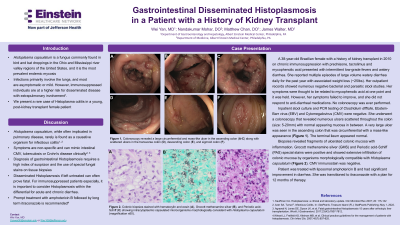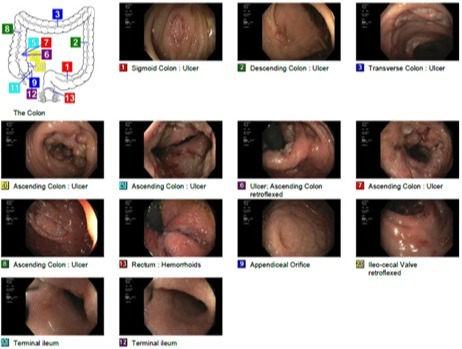Back


Poster Session B - Monday Morning
Category: Colon
B0111 - Gastrointestinal Disseminated Histoplasmosis in a Patient With History of Kidney Transplant
Monday, October 24, 2022
10:00 AM – 12:00 PM ET
Location: Crown Ballroom

Has Audio

Wei Yan, MD
Albert Einstein Medical Center
Philadelphia, PA
Presenting Author(s)
Wei Yan, MD1, Nandakumar Mohan, DO1, Otoniel Hill, MD2, Matthew Chan, DO1, Prutha Shah, DO1, James Walter, MD1
1Albert Einstein Medical Center, Philadelphia, PA; 2Albert Einstein Medical Cneter, Philadelphia, PA
Introduction: Histoplasma capsulatum is a fungus commonly found in bird and bat droppings in the Ohio and Mississippi river valley regions of the United States. Infection with this fungus can range from mild, asymptomatic pneumonia, cavitating pulmonary lesions, to disseminated disease with multiorgan involvement. Immunosuppressed patients are at higher risk for infectious complications than the general population. We present a very rare case of Histoplasma colitis in a young, post-kidney transplant female.
Case Description/Methods: Patient is a 38-year-old Brazilian female with known history of kidney transplant in 2010 on chronic immunosuppression with prednisone, tacrolimus, and mycophenolic acid and hypertension who initially presented with intermittent low-grade fevers and chronic diarrhea. She reported persistent large volume watery diarrhea for the past year with associated weight loss. Outpatient infectious stool studies have been negative on numerous occasions. However, given her fevers and immunosuppressed state, Clostridium difficile, EBV and CMV PCR were sent. Despite supportive care and negative testing, her diarrhea persisted. Patient underwent a colonoscopy that revealed multiple ulcers in the entirety of the colon with a very large ulcer that was circumferential and mass-like in the ascending colon (ulcers ranged from 5 – 20 mm). Biopsies revealed fragments of ulcerated colonic mucosa with inflammation and organisms compatible with Histoplasma capsulatum with negative CMV but positive GMS and PAS staining. CMV staining was negative. The patient was then appropriately started on liposomal amphotericin B for disseminated histoplasmosis and had significant improvement in diarrhea with plans to transition to itraconazole for a total of 12 months of therapy.
Discussion: Common pathogens involved in infectious colitis include bacteria such as Campylobacter, Salmonella, Shigella, E. coli, viruses such as Cytomegalovirus (CMV), Norovirus, Rotavirus, and Adenovirus, and sexually transmitted infections such as Neisseria gonorrhoeae, Chlamydia trachomatis, and Herpes simplex. Fungal pathogens such as Histoplasmosis capsulatum rarely is found as a causative organism for infectious colitis. Our case adds to the scarce literature demonstrating this presentation of a common fungal pathogen. Keeping a high index of suspicion for severe infections, especially in individuals who are immunosuppressed, can allow for prompt and appropriate anti-microbial treatment and stewardship.

Disclosures:
Wei Yan, MD1, Nandakumar Mohan, DO1, Otoniel Hill, MD2, Matthew Chan, DO1, Prutha Shah, DO1, James Walter, MD1. B0111 - Gastrointestinal Disseminated Histoplasmosis in a Patient With History of Kidney Transplant, ACG 2022 Annual Scientific Meeting Abstracts. Charlotte, NC: American College of Gastroenterology.
1Albert Einstein Medical Center, Philadelphia, PA; 2Albert Einstein Medical Cneter, Philadelphia, PA
Introduction: Histoplasma capsulatum is a fungus commonly found in bird and bat droppings in the Ohio and Mississippi river valley regions of the United States. Infection with this fungus can range from mild, asymptomatic pneumonia, cavitating pulmonary lesions, to disseminated disease with multiorgan involvement. Immunosuppressed patients are at higher risk for infectious complications than the general population. We present a very rare case of Histoplasma colitis in a young, post-kidney transplant female.
Case Description/Methods: Patient is a 38-year-old Brazilian female with known history of kidney transplant in 2010 on chronic immunosuppression with prednisone, tacrolimus, and mycophenolic acid and hypertension who initially presented with intermittent low-grade fevers and chronic diarrhea. She reported persistent large volume watery diarrhea for the past year with associated weight loss. Outpatient infectious stool studies have been negative on numerous occasions. However, given her fevers and immunosuppressed state, Clostridium difficile, EBV and CMV PCR were sent. Despite supportive care and negative testing, her diarrhea persisted. Patient underwent a colonoscopy that revealed multiple ulcers in the entirety of the colon with a very large ulcer that was circumferential and mass-like in the ascending colon (ulcers ranged from 5 – 20 mm). Biopsies revealed fragments of ulcerated colonic mucosa with inflammation and organisms compatible with Histoplasma capsulatum with negative CMV but positive GMS and PAS staining. CMV staining was negative. The patient was then appropriately started on liposomal amphotericin B for disseminated histoplasmosis and had significant improvement in diarrhea with plans to transition to itraconazole for a total of 12 months of therapy.
Discussion: Common pathogens involved in infectious colitis include bacteria such as Campylobacter, Salmonella, Shigella, E. coli, viruses such as Cytomegalovirus (CMV), Norovirus, Rotavirus, and Adenovirus, and sexually transmitted infections such as Neisseria gonorrhoeae, Chlamydia trachomatis, and Herpes simplex. Fungal pathogens such as Histoplasmosis capsulatum rarely is found as a causative organism for infectious colitis. Our case adds to the scarce literature demonstrating this presentation of a common fungal pathogen. Keeping a high index of suspicion for severe infections, especially in individuals who are immunosuppressed, can allow for prompt and appropriate anti-microbial treatment and stewardship.

Figure: Fragmented and ulcerated mucosa in patient with disseminated gastrointestinal histoplasmosis
Disclosures:
Wei Yan indicated no relevant financial relationships.
Nandakumar Mohan indicated no relevant financial relationships.
Otoniel Hill indicated no relevant financial relationships.
Matthew Chan indicated no relevant financial relationships.
Prutha Shah indicated no relevant financial relationships.
James Walter indicated no relevant financial relationships.
Wei Yan, MD1, Nandakumar Mohan, DO1, Otoniel Hill, MD2, Matthew Chan, DO1, Prutha Shah, DO1, James Walter, MD1. B0111 - Gastrointestinal Disseminated Histoplasmosis in a Patient With History of Kidney Transplant, ACG 2022 Annual Scientific Meeting Abstracts. Charlotte, NC: American College of Gastroenterology.
